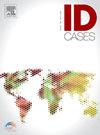Disseminated Ureaplasma infection: A case report of septic polyarthritis in a patient on Rituximab therapy
IF 1.1
Q4 INFECTIOUS DISEASES
引用次数: 0
Abstract
Introduction
Immunocompromised individuals, such as those undergoing Rituximab therapy, are susceptible to severe infections by these organisms. We present a rare case of polyarticular septic arthritis caused by disseminated Ureaplasma urealyticum in a Rituximab-treated patient.
Presentation of case
A 38-year-old male with a history of schizophrenia and multiple sclerosis presented with intense pain, swelling, and fever, along with limited joint mobility. Despite initial treatment with antibiotics and surgical intervention, the patient's condition deteriorated. PCR assays confirmed the presence of Ureaplasma urealyticum, prompting a change in antibiotic therapy. With focused antimicrobial treatment and supportive care, the patient exhibited gradual improvement, although reinfection occurred one month after discharge, necessitating additional surgical interventions and antibiotic therapy.
Discussion
Septic arthritis due to Ureaplasma urealyticum is exceedingly rare but can occur in immunocompromised patients undergoing Rituximab therapy. Accurate pathogen identification using PCR assays is crucial for optimizing therapeutic outcomes in such cases. Treatment typically involves a combination of surgical debridement and tailored antimicrobial therapy with agents effective against Ureaplasma species. Close monitoring for disease recurrence and joint function is essential for long-term management.
Conclusion
This case highlights the diagnostic challenges and therapeutic complexities of septic arthritis caused by Ureaplasma urealyticum in immunocompromised patients undergoing Rituximab treatment. Interdisciplinary collaboration and the use of PCR assays for accurate pathogen identification are crucial for successful outcomes in such cases. Clinicians should consider the unique susceptibility of immunocompromised individuals to rare pathogens and tailor antimicrobial therapy accordingly.
播散性解脲支原体感染:一例利妥昔单抗治疗患者的脓毒性多关节炎病例报告
导言接受利妥昔单抗治疗等免疫功能低下者很容易受到这些微生物的严重感染。病例介绍一名 38 岁男性患者,有精神分裂症和多发性硬化症病史,出现剧烈疼痛、肿胀和发热,关节活动受限。尽管最初使用了抗生素和手术治疗,但患者的病情还是恶化了。PCR 检测证实患者体内存在尿解支原体,这促使患者改变了抗生素疗法。讨论尿解支原体引起的化脓性关节炎极为罕见,但可发生在接受利妥昔单抗治疗的免疫功能低下患者中。使用 PCR 检测法准确鉴定病原体对于优化此类病例的治疗效果至关重要。治疗通常包括外科清创和使用对解脲脲原体有效的药物进行定制抗菌治疗。本病例凸显了接受利妥昔单抗治疗的免疫功能低下患者中尿解脲原体引起的化脓性关节炎的诊断挑战和治疗复杂性。跨学科合作和使用 PCR 检测法准确鉴定病原体对于此类病例的成功治疗至关重要。临床医生应考虑到免疫功能低下者对罕见病原体的独特敏感性,并相应地调整抗菌治疗。
本文章由计算机程序翻译,如有差异,请以英文原文为准。
求助全文
约1分钟内获得全文
求助全文

 求助内容:
求助内容: 应助结果提醒方式:
应助结果提醒方式:


